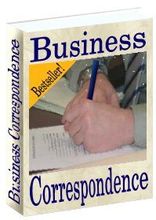

Business Correspondence
$2.99
$2.99
Get Instant access!
Business Correspondence
BUSINESS CORRESPONDENCE
HOW TO WRITE THE BUSINESS LETTER:
24 chapters on preparing to write the letter and finding the proper viewpoint; how to open the letter, present the proposition convincingly, make an effective close; how to acquire a forceful style and inject originality; how to adapt selling appeal to different prospects and get orders by letter-- proved principles and practical schemes illustrated by extracts from 217 actual letters.
Business Correspondence teaches correct formats and practical approaches to basic office correspondence. The book is full of cases and comparison of various interpersonal styles, this book is an excellent practical resource for readers who need to master practical business writing and interpersonal skills.
CONTENTS
BUSINESS CORRESPONDENCE
PART I
Preparing to Write the Letter
CHAPTER
1: What You Can Do With a Postage Stamp
2: The Advantages of Doing Business by Letter
3: Gathering Material and Picking Out Talking Points
4: When You Sit Down to Write
PART II
How to Write the Letter
5: How to Begin a Business Letter
6: How to Present Your Proposition
7: How to Bring the Letter to a Close
PART III
Style--Making the Letter Readable
8: "Style" in Letter Writing--And How to Acquire It
9: Making the Letter Hang Together
10: How to Make Letters Original
11: Making the Form Letter Personal
PART IV
The Dress of a Business Letter
12: Making Letterheads and Envelopes Distinctive
13: The Typographical Make-up of Business Letters
14: Getting a Uniform Policy and Quality in Letters
15: Making Letters Uniform in Appearance
PART V
Writing the Sales Letter
16: How to Write the Letter That Will "Land" the Order
17: The Letter That Will Bring An Inquiry
18: How to Close Sales by Letter
19: What to Enclose With Sales Letters
20: Bringing in New Business by Post Card
21: Making it Easy for the Prospect to Answer
PART VI
The Appeal to Different Classes
22: How to Write Letters That Appeal to Women
23: How to Write Letters That Appeal to Men
24: How to Write Letters That Appeal to Farmers
Book Excerpts:
There is a firm in Chicago, with a most interesting bit of inside history. It is not a large firm. Ten years ago it consisted of one man. Today there are some three hundred employees, but it is still a one-man business. It has never employed a salesman on the road; the head of the firm has never been out to call on any of his customers.
But here is a singular thing: you may drop in to see a business man in Syracuse or San Francisco, in Jacksonville or Walla Walla, and should you casually mention this man's name, the chances are the other will reply: "Oh, yes. I know him very well. That is, I've had several letters from him and I feel as though I know him."
Sitting alone in his little office, this man was one of the first to foresee, ten years ago, the real possibilities of the letter. He saw that if he could write a man a thousand miles away the right kind of a letter he could do business with him as well as he could with the man in the next block.
So he began talking by mail to men whom he thought might buy his goods--talking to them in sane, human, you-and-me English. Through those letters he sold goods. Nor did he stop there. In the same human way he collected the money for them.
He adjusted any complaints that arose. He did everything that any business man could do with customers. In five years he was talking not to a thousand men but to a million. And today, though not fifty men in the million have ever met him, this man's personality has swept like a tidal wave across the country and left its impression in office, store and factory--through letters--letters alone.
This instance is not cited because it marks the employment of a new medium, but because it shows how the letter has become a universal implement of trade; how a commonplace tool has been developed into a living business-builder.
The letter is today the greatest potential creator and transactor of business in the world. But wide as its use is, it still lies idle, an undeveloped possibility, in many a business house where it might be playing a powerful part.
The letter is a universal implement of business--that is what gives it such great possibilities. It is the servant of every business, regardless of its size or of its character. It matters not what department may command its use--wherever there is a business in which men must communicate with each other, the letter is found to be the first and most efficient medium.
